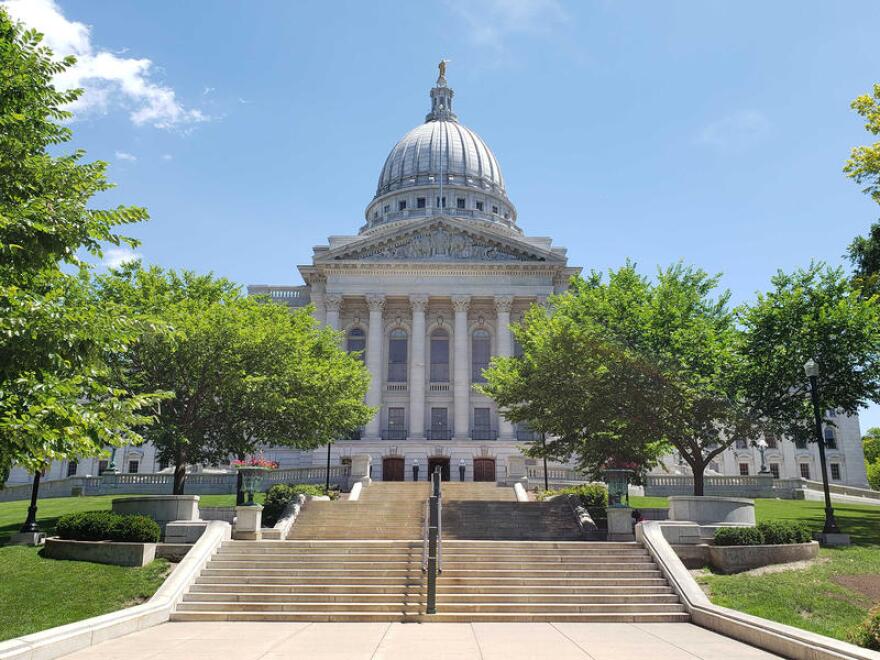The battle over drawing new political boundary lines in Wisconsin is heating up, with federal judges telling the Legislature and Gov. Tony Evers on Tuesday that it wants to have new maps enacted by March.
U.S. District Judge James Peterson said the court needs to prepare to draw maps if Republican lawmakers and the Democratic governor can't agree.
“It may all be for naught if the state succeeds in drawing its maps and enacting them into law,” Peterson said. “If history is any guide, there is at least, to put it mildly, there’s at least a substantial likelihood that divided government in the state of Wisconsin will have trouble as they have in the past drawing its own maps.”
A federal lawsuit that seeks to have the court draw the new boundaries is moving forward even as the Republican-controlled Legislature argues that the legal battle should be fought in state court. All of this is happening before the Legislature has introduced new maps, let alone voted on them or sent anything to Evers.
A look at redistricting and where it stands in Wisconsin:
WHAT IS REDISTRICTING?
Redistricting is the process, done once a decade, of redrawing political boundary lines based on the latest census showing how populations have changed in neighborhoods, cities and counties since 2010. U.S. House and state legislative districts must be redrawn to rebalance their populations. But mapmakers can create an advantage for their political party in future elections by packing opponents’ voters into a few districts or spreading them thin among multiple districts — a process known as gerrymandering.
The Wisconsin Legislature is in charge of drawing the lines for the state's eight congressional districts and 132 legislative districts. Local governments also must draw new lines for local offices.
HOW HAS THE PROCESS WORKED IN WISCONSIN?
In 2011, when Republicans controlled the Legislature and Republican Scott Walker was governor, they enacted maps over objections from Democrats who argued they consolidated and solidified GOP power through gerrymandering.
Republicans gained seats in the Legislature over the past decade, even as Democrats won statewide elections for governor, attorney general and U.S. Senate in 2018 and in 2020 elected President Joe Biden over former President Donald Trump.
With a divided government this year, the expectation is a court will have to ultimately draw the maps. That is what happened in Wisconsin under divided governments in 1982, 1992 and 2002.
WHO IS DRAWING MAPS NOW?
Evers established a commission to solicit public input over the past year with the ultimate goal of producing a map based off of those comments. Evers argues it is a more nonpartisan way to approach redistricting. That group, known as the People’s Maps Commission, is expected to release its map by the end of October.
The Legislature does not have to consider that map, or any independently drawn map. And Republican Assembly Speaker Robin Vos initially criticized Evers' creation of the commission as a “fake, phony, partisan process.” But Republican leaders subsequently created a website and said they will entertain maps drawn by the commission and anyone else that are submitted by Oct. 15.
“With this broad public input, we are confident we will create a map that the governor will sign,” Vos and Senate Majority Leader Devin LeMahieu said last week.
WHO IS SUING?
There are two lawsuits, one in federal court and one in state court. The federal lawsuit combines a pair of cases first brought by the attorney leading the Democratic Party’s legal fight against new voting restrictions and by Democratic-supported groups including Black Leaders Organizing for Communities, Voces de la Frontera and the League of Women Voters of Wisconsin.
>>Wisconsin Redistricting Lawsuits: What They Can And Can't Address
The Legislature and the conservative group Wisconsin Institute for Law and Liberty are fighting that lawsuit, and instead argue the case belongs before the Wisconsin Supreme Court. A lawsuit brought by WILL and supported by the Legislature is pending before the conservative-controlled state Supreme Court, which has yet to say whether it will take the case.
WHAT IS HAPPENING IN FEDERAL COURT?
The three-judge panel held a hearing Tuesday, telling attorneys it wants to prepare for resolving the trial in the case by Jan. 28 so there will be time to enact new maps by March. The Legislature objects to the case moving forward, and its attorney Kevin St. John said he is considering appealing to the U.S. Supreme Court to stop the lawsuit from proceeding.
The Legislature argues that the case is premature because the legislative process of debating and passing maps for the governor to consider hasn't happened yet. St. John didn't give a firm date for when the Legislature would complete that work, saying only that it could happen anytime between November and early March.
The Wisconsin Election Commission says new maps must be in place by March 1 to meet deadlines in state law for candidates circulating nomination papers to be on the ballot in the fall. The Legislature argues maps could be enacted later.





